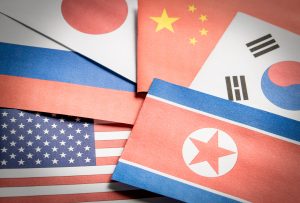It would be easy to reach an agreement with North Korea if that were all Washington hoped to achieve.
All the United States would have to do is to recognize North Korea as a nuclear power; end U.S. and U.N. economic sanctions; withdraw U.S. military forces from the Korean Peninsula and perhaps from the region; normalize relations by reciprocally opening embassies in Pyongyang and Washington; and to stop criticizing North Korea for its cyber crimes and human rights abuses. That probably constitutes the list of what North Korea considers the United States’ “hostile policies,” to which it demands an end. Beyond that, Pyongyang might also expect to receive a large package of humanitarian and economic assistance. North Korea would sign such an agreement tomorrow.
The alternative path to a quick agreement would be for North Korea to offer to disband its nuclear and long-range missile programs; provide an inventory of its nuclear and chemical weapons holdings and surrender them for destruction; allow unrestricted inspections on North Korean territory by the International Atomic Energy Agency (IAEA): pull back from the DMZ artillery and missiles that threaten Seoul and open conventional arms talks with South Korea; cease its cyberattacks and thefts; and welcome a visit by the United Nations’ Special Rapporteur on the situation of human rights in North Korea. The United States and South Korea would respond positively to such a package.
Neither of these scenarios is going to happen, but they are useful thought experiments to see how far apart the two sides are. Under the first, the United States would believe that it, along with South Korea and other allies, had been left vulnerable to North Korean aggression and blackmail in the face of ongoing uncertainty regarding Pyongyang’s ultimate motives. Kim Jong Un would almost certainly believe that the latter scenario would result in the end of his regime. Neither of the beliefs is necessarily true but implies that stability cannot be reached by either side “winning.” The point of maximum stability probably lies in both sides being only partially content with the outcome.
As a consequence, negotiations to achieve stability with North Korea will necessarily be protracted. Nuclear agreements alone are complicated documents – the Joint Comprehensive Plan of Action with Iran is 140 pages long. But as complex as a Korean nuclear agreement would be, it would not be sufficient. North Korea’s nuclear weaponry is a symptom, not the cause, of tensions on the Korean Peninsula. Resolving what the 1953 Korean War Armistice calls “the Korean problem” demands a process, not an imagined, ideal outcome.
With bilateral talks between the United States and North Korea at an apparent dead end, and with the global landscape upended by Russia’s invasion of Ukraine, it is time to consider alternatives regarding North Korea diplomacy.
One model that did not ultimately succeed, but which came closer than anything before or since in recent times, was the Six-Party Talks that ran from 2003 to 2009. During the six rounds of talks over six years, an agreement was reached on North Korean denuclearization and other issues. Analysts differ on why the agreement was not successfully implemented, but blame cannot be pinned on the Six-Party mechanism itself.
Because of the Ukraine War, including Russia in a new round of multilateral talks is out of the question, but the remaining five parties – China, Japan, North Korea, South Korea, and the United States – might well see advantages to picking up where the Six-Party Talks left off. If they want to reuse stationery, Mongolia might be a helpful addition to the negotiations to keep it at six countries.
A key advantage would be that this approach would bring China within the ambit of the process, rather than leaving a wall to be built between Beijing-Moscow-Pyongyang on one side and the United States, South Korea, Japan, and other allies on the other. Hard bipolarity will make it hard to peacefully resolve the North Korea problem.
Another advantage is that China would be incentivized to apply pressure on North Korea to refrain from nuclear and long-range missile testing during times when China would host these multilateral negotiations. Although the offer would not be public, it is easy to imagine a quiet or implicit agreement between Washington and Beijing that China would be given the right to host the new round of talks in exchange for its offer to prevent North Korean provocations.
Because China and North Korea have both said in recent years that they would support a resumption of Six-Party Talks, this suggestion is less fanciful than it might sound. Would China agree to resume talks without Russia present? That might depend on the outcome of the current debate in Beijing over the costs versus benefits of being tied to Vladimir Putin.
With new administrations in Washington, Seoul, and Tokyo, and a lack of alternative ways forward, maybe it is time to consider restarting multilateral talks. Even if they dragged on for years, would that necessarily be bad? It is hard to disparage buying time at a moment when history is accelerating.

































